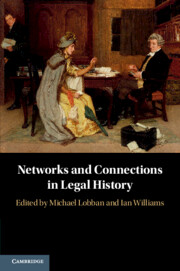Book contents
- Networks and Connections in Legal History
- Networks and Connections in Legal History
- Copyright page
- Contents
- Contributors
- 1 Introduction
- 2 Networks and Influences
- 3 Men of Law and Legal Networks in Aberdeen, Principally in 1600–1650
- 4 Calling Time at the Bar
- 5 The Thistle, the Rose, and the Palm
- 6 ‘The Bengal Boiler’
- 7 The White Ensign on Land
- 8 A Broker’s Advice
- 9 Trans-Atlantic Connections
- 10 Interpretatio ex aequo et bono
- 11 Shakespeare and the European ius commune
- 12 Law Reporting and Law-Making
- 13 John Taylor Coleridge and English Criminal Law
- Index
12 - Law Reporting and Law-Making
The Missing Link in Nineteenth-Century Tax Law
Published online by Cambridge University Press: 10 August 2020
- Networks and Connections in Legal History
- Networks and Connections in Legal History
- Copyright page
- Contents
- Contributors
- 1 Introduction
- 2 Networks and Influences
- 3 Men of Law and Legal Networks in Aberdeen, Principally in 1600–1650
- 4 Calling Time at the Bar
- 5 The Thistle, the Rose, and the Palm
- 6 ‘The Bengal Boiler’
- 7 The White Ensign on Land
- 8 A Broker’s Advice
- 9 Trans-Atlantic Connections
- 10 Interpretatio ex aequo et bono
- 11 Shakespeare and the European ius commune
- 12 Law Reporting and Law-Making
- 13 John Taylor Coleridge and English Criminal Law
- Index
Summary
The defining characteristic of common law systems is the development of law through the resolution of disputes by the judges. This precept is anchored in the doctrine of judicial precedent, effected through a system of courts reflecting a hierarchical network of authority. Judicial precedent depends on an authoritative and accessible report of the courts’ decisions. In the long nineteenth century this connection was weak or non-existent in the law of tax. In the rare instances where appeals were permitted, few were reported in a form acceptable to the emerging doctrine of judicial precedent. This had a profound effect on the nascent substantive tax law. It inhibited the robust development of its principles and the interpretation of tax legislation, thereby undermining the quality of tax law and process. It also promoted the isolation of tax law from the norms and values of the legal system well into the twentieth century.
Keywords
- Type
- Chapter
- Information
- Networks and Connections in Legal History , pp. 285 - 306Publisher: Cambridge University PressPrint publication year: 2020

